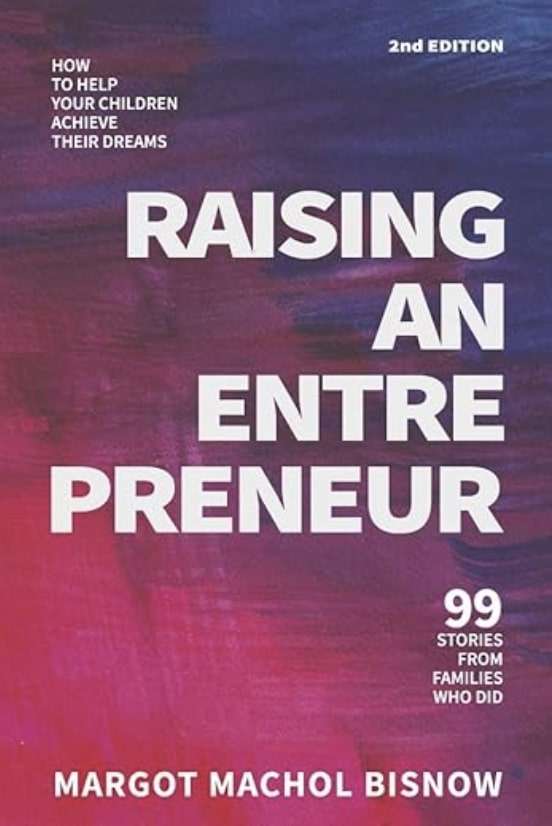It was Margot Machol Bisnow’s curiosity that blossomed into a passion—one she had never previously considered.
The year was 2008; the setting was a gathering of entrepreneurs, organized in part by her eldest son—a budding entrepreneur.
“I just hadn’t met a lot of entrepreneurs at that point,” Bisnow told Lianne Castelino during an interview for Where Parents Talk. “And I’d say, ‘I’m just so curious how you turned out the way you did—so willing to work so hard on something you believed in and take on so much risk.’ And they all basically told me the same thing. They all said, ‘I had someone who believed in me, who told me I could do anything I put my mind to.’ Most of the time, that was a parent.”
It set Bisnow down a path of discovery on multiple levels for over a decade—a different landscape than the one she was familiar with after more than 20 years working for the U.S. government, including as staff director of the President’s Council of Economic Advisers, as well as in the nonprofit sector.
Thanks to her son, Bisnow was in regular contact with people running their own businesses, and she remained fascinated. “Someone along the way always said [to them], ‘I know you can do whatever you put your mind to. I believe in you.’ And I was so struck by this.”
As her exposure to, interactions with, and learnings from entrepreneurs grew, so too did their insistence that Bisnow write a book compiling her discoveries. “They finally wore me down!” That request yielded her first book, How to Help Your Children Achieve Their Dreams: 99 Stories from Families Who Did.
“I picked 70 people, super diverse—half men, half women, every race, every religion, every socioeconomic background, born overseas, immigrant parents, big families, small families, divorced, married parents,” says Bisnow.
“Highly educated parents, parents who hadn’t finished high school—whatever. And to my amazement, they were basically all raised the same,” says the mother of two boys. She was also buoyed by societal trends: “There’s so many unhappy kids today, and it’s so important to me to get this message out to parents about how to raise happy, confident, resilient, thriving kids.”

What the Research Revealed
What did Bisnow discover from her interviews with 70 families? It starts with some foundational food for thought for parents. “I would say to parents, your goal shouldn’t be that your child ends up in a career where they can make some money and they’re miserable. That’s not a good plan.”
She also clarifies her definition of entrepreneur: “For me, an entrepreneur is anyone who starts something. It’s not just some guy with a for-profit business. It can be anyone with anything they’ve started that they believe in. I think it’s really important—when I talk about entrepreneurship, it’s more just a way of thinking and a mindset,” she says.
Both of Bisnow’s sons are entrepreneurs—one started a band, the other a conference series. “You can’t make your child an entrepreneur any more than you can make them an orchestra conductor or a doctor,” she says. “You can create the conditions so that if it’s a path they choose, they’re ready for it, but it’s not something you can force.”

Dreaming Big Through Passion-based Learning
Among the entrepreneurs she interviewed: YouTube CEO Susan Wojcicki, Under Armour founder Kevin Plank, Grammy-winning songwriter Benny Blanco, and film director Jon Chu, whose movie Wicked won two Oscars at the 2025 Academy Awards.
“His parents were immigrants,” Bisnow recounts about Chu. “They have a Chinese restaurant in Palo Alto. And from fourth grade, he discovered filming. He’d gotten a little movie license, and on a vacation, he just fell in love with it—it was like all he wanted to do. He had a little company in high school, filming people’s weddings. His parents weren’t that enthusiastic. They wanted him to have a normal job.”
Bisnow learned Chu’s parents’ view changed one day when he was in high school. “He was supposed to be asleep. His mom came in. He was doing a movie on his laptop, and his mom said, ‘Put that away and stop wasting your time. You need to get some rest. You need to be prepared for school tomorrow, which is really important.’ And he burst into tears and said, ‘You can’t make me stop. It’s what I love. It’s what I want to do with my life.’ And she said, ‘Go to sleep. We’ll talk about it tomorrow.’ And the next day, she picked him up at school. She’d gone to the library and she had 10 filmmaking books. And she said, ‘If you want to do it, be the best.'”

The Formula for Success
Among Bisnow’s key learnings about entrepreneurs and tips for parents:
-
“Every entrepreneur I’ve spoken to had a passion outside of school. And in every case, their parents supported that passion.”
-
“The biggest difference between entrepreneurs and people who go into other jobs is their attitude toward failure… failure is how you learn and grow.”
-
“It’s our job to look… to pay attention.”
When asked what struck her most from the interviews she conducted, Bisnow is quick to respond: “…no matter how different these families were—some had parents who were doctors, some had parents who hadn’t graduated from high school—and no matter what, they all had a lot of expectations: about behaviour, about how you’re part of a family, how you show up for meals, how you are polite, how you help around the house, and how you’re financially responsible. They all had expectations about behaviour, but they all gave them huge freedom to be independent, to explore.”

Why Good Grades Aren’t Enough Anymore
Bisnow believes supporting entrepreneurship—or any passion—starts with creating a space where exploration is encouraged, not feared. When your child doesn’t know exactly what they want to do after high school, it’s tempting to rush them toward a “safe” choice. But as she points out, true passion is rarely discovered under pressure. “You have to see what gives your child joy. And you have to tell them, by the way, we’re so proud of your success in that.”
At a time when young innovators are reshaping industries and redefining success, fostering an entrepreneurial mindset has become just as crucial as academic achievement. Modern parenting is also being challenged to evolve.
Parents who solely encourage good grades or resume-building activities are likely falling short. Instead, becoming champions of passion, curiosity, resilience—and sometimes, a little bit of risk—is important.
As Bisnow shares, “Our role as parents isn’t to dictate their future, but to help them discover and develop their passions.”
Related links
Related articles
Entrepreneur by Design: Charting a New Path for Motherhood and Career
How to Become a Mom Entrepreneur
